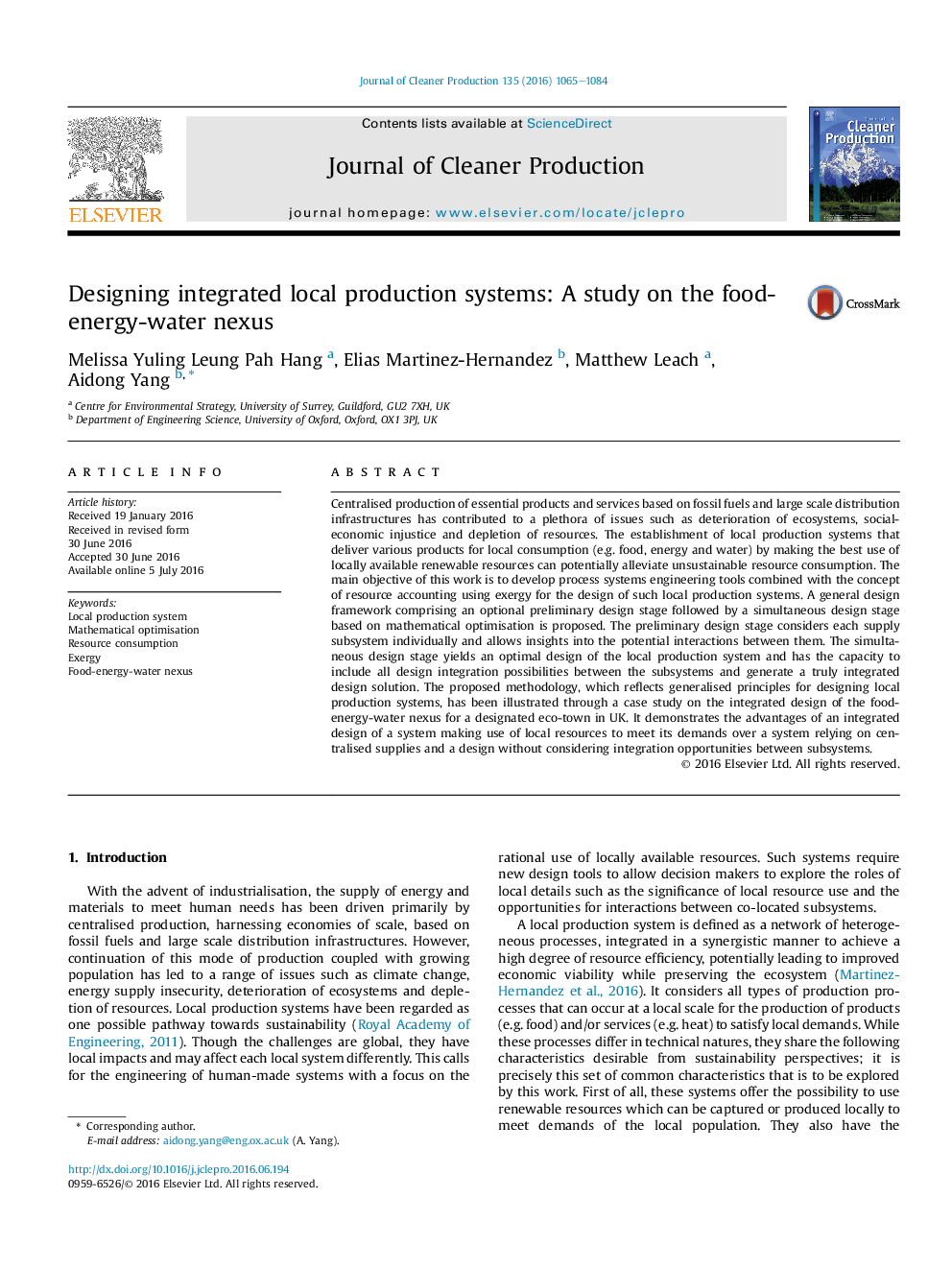| کد مقاله | کد نشریه | سال انتشار | مقاله انگلیسی | نسخه تمام متن |
|---|---|---|---|---|
| 8101386 | 1522115 | 2016 | 20 صفحه PDF | دانلود رایگان |
عنوان انگلیسی مقاله ISI
Designing integrated local production systems: A study on the food-energy-water nexus
ترجمه فارسی عنوان
طراحی یک سیستم تولید محلی یکپارچه: مطالعهی مربوط به ارتباطات انرژی-آب-غذایی
دانلود مقاله + سفارش ترجمه
دانلود مقاله ISI انگلیسی
رایگان برای ایرانیان
کلمات کلیدی
سیستم تولید محلی بهینه سازی ریاضی، مصرف منابع، اگزرژی، غذا-انرژی-آب-نکسوس،
ترجمه چکیده
تولید متمرکز محصولات و خدمات ضروری مبتنی بر سوخت های فسیلی و زیرساخت های توزیع گسترده، موجب ایجاد بسیاری از مسائلی نظیر تضعیف اکوسیستم، بی عدالتی اجتماعی-اقتصادی و کاهش منابع بوده است. ایجاد سیستم های تولید محلی که محصولات متنوعی را برای مصرف محلی (مانند غذا، انرژی و آب) ارائه می دهند و بهترین استفاده از منابع تجدیدپذیر در دسترس محلی را به طور بالقوه می توانند به کاهش مصرف منابع نامناسب کمک کنند. هدف اصلی این کار توسعه ابزارهای مهندسی سیستم های فرآیند همراه با مفهوم حسابداری منابع با استفاده از اگزرگا برای طراحی چنین سیستم های تولید محلی می باشد. چارچوب طراحی کلی شامل یک مرحله طراحی اولیه اختیاری و یک مرحله طراحی همزمان بر اساس بهینه سازی ریاضی است. مرحله طراحی اولیه، هر زیرسیستم عرضه را به صورت جداگانه در نظر می گیرد و اجازه می دهد بینش های مربوط به تعاملات بالقوه بین آنها را مورد بررسی قرار دهد. مرحله طراحی همزمان، طراحی مطلوب سیستم تولید محلی را به وجود می آورد و توانایی شامل تمام امکانات ادغام طراحی بین زیرسیستم ها و تولید یک راه حل مستحکم طراحی شده است. روش پیشنهادی که اصول کلی برای طراحی سیستم های تولید محلی را نشان می دهد، از طریق یک مطالعه موردی در طراحی یکپارچه ارتباطات غذایی انرژی-آب برای یک شهر زیست محیطی در انگلیس نشان داده شده است. این مزایای یک طراحی یکپارچه از یک سیستم استفاده از منابع محلی را برای پاسخگویی به خواسته های آن ها بر روی یک سیستم متکی بر منابع متمرکز و طراحی بدون توجه به فرصت های ادغام بین زیر سیستم ها نشان می دهد.
موضوعات مرتبط
مهندسی و علوم پایه
مهندسی انرژی
انرژی های تجدید پذیر، توسعه پایدار و محیط زیست
چکیده انگلیسی
Centralised production of essential products and services based on fossil fuels and large scale distribution infrastructures has contributed to a plethora of issues such as deterioration of ecosystems, social-economic injustice and depletion of resources. The establishment of local production systems that deliver various products for local consumption (e.g. food, energy and water) by making the best use of locally available renewable resources can potentially alleviate unsustainable resource consumption. The main objective of this work is to develop process systems engineering tools combined with the concept of resource accounting using exergy for the design of such local production systems. A general design framework comprising an optional preliminary design stage followed by a simultaneous design stage based on mathematical optimisation is proposed. The preliminary design stage considers each supply subsystem individually and allows insights into the potential interactions between them. The simultaneous design stage yields an optimal design of the local production system and has the capacity to include all design integration possibilities between the subsystems and generate a truly integrated design solution. The proposed methodology, which reflects generalised principles for designing local production systems, has been illustrated through a case study on the integrated design of the food-energy-water nexus for a designated eco-town in UK. It demonstrates the advantages of an integrated design of a system making use of local resources to meet its demands over a system relying on centralised supplies and a design without considering integration opportunities between subsystems.
ناشر
Database: Elsevier - ScienceDirect (ساینس دایرکت)
Journal: Journal of Cleaner Production - Volume 135, 1 November 2016, Pages 1065-1084
Journal: Journal of Cleaner Production - Volume 135, 1 November 2016, Pages 1065-1084
نویسندگان
Melissa Yuling Leung Pah Hang, Elias Martinez-Hernandez, Matthew Leach, Aidong Yang,
